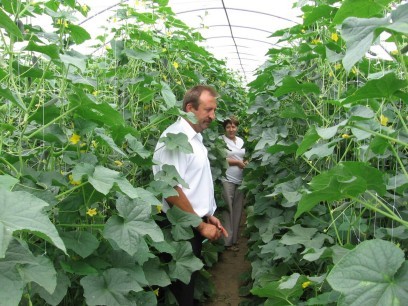
Moldova is one of the most agriculture-dependent countries in Europe, yet current water reserves are already classified as “insufficient”. Climate change forecasting predicts that available surface water will decrease by up to 20% by 2020, further endangering human health, the ecosystem and the economy.
“Drought is a climate risk of particular concern for me and for all farmers in Moldova,” says Victor Burcovschi, the owner and manager of a large vegetable farm in the north of the country. “Much of the precipitation as rain is lost through evaporation or flows into rivers before use. Therefore, it is important to manage the quantity of precipitation through capturing it into reservoirs and using it in agriculture production, in particular for field and indoor vegetable irrigation, peaches and apricot production.”
To address current and future water shortages, Moldova’s Ministry of Environment has partnered with the Austrian Development Cooperation Agency and the Austrian Federal Ministry of Agriculture, Forestry, Environment and Water Management, in a project to build resilience to climate change impacts in the medium and long-term. The project is implemented by the Climate Change Office within the Moldova Ministry of Environment, with technical support from UNDP.
The climate change project works in the agriculture, energy and water sectors to foster stronger planning and budgeting for adaptation strategies. For the water sector work, the project identified six high priority districts in Moldova and instituted a small grant programme for regional councils.
As part of the work under the small grant programme, two pilot reservoir projects are under way. In the Sîngerei district in the north, a reconstructed reservoir uses snowmelt and rainfall to bolster groundwater storage ponds, ensuring that crops can continue to be irrigated during heat waves and droughts. This secure water source benefits 3,500 residents in Tiplesti village and residents of neighbouring settlements – including Mr. Burcovschi and his peach and apricot groves.
With the restored reservoir, irrigation is now viable, soil erosion is reduced, and productivity is increasing. As the spring and summer of 2016 approaches, the farmers of the Sîngerei district can already see results, with a combination of snowmelt and spring water beginning to fill the reconstructed reservoir and serving as a springboard for the new season’s planting.
In the Călărași district, the rebuilt reservoir is used to irrigate six hectares of open vegetable fields and 14.5 hectares of greenhouse space. These innovative sites are connected with an aqueduct that feeds drip and spray irrigation throughout the hybrid indoor/outdoor growing space. This water is invaluable to 800 residents of Buda village, as well as for the residents of neighbouring settlements.
Valeriu Agapie is manager of the Radu Agapi Peasant Farm in Buda village, Călărași district. “Some time ago, our private business was at risk due to unfavourable climate conditions – in particular drought – and we desperately looked for solutions,” says the father of two who has lived in the village all his life. “Now, after building the reservoir, which will allow collection and storage of rainwater and provide a convenient and reliable water supply, we are making plans for this year’s production and for upcoming years. The project helped to maintain the business and the well-being of our community.”
Water management is an important part of a comprehensive strategy for adapting to a changing climate in Moldova. Small-scale collection infrastructure can contribute greatly to water availability for crop production during summer, when the little rainfall received is usually very intense for brief periods, but non-existent during seasonal dry periods and droughts.
Based on the results of the pilot project, plans are under way to expand the use of similar technologies to rural communities across Moldova. Scaling up water management projects is an effective way of decreasing climate vulnerability and ensuring the food security of rural communities and the entire country. These new measures will go a long way to protect Moldova’s vital agricultural sector and ensure that business and communities are able to bloom.
Highlights
- A UNDP-backed project works in the agriculture, energy and water sectors to foster stronger planning and budgeting for climate change adaptation.
- With reservoirs restored in two remote areas, irrigation is now viable, soil erosion is reduced, and agricultural productivity is increasing.
- The reconstructed reservoirs will help increase the harvest of vegetables in the two rural districts by 30-40%.
- The project aims to increase the profitability and competitiveness of 1,602 farm households, reduce poverty and raise the standard of living of these rural communities in Moldova.
- 59 men and 11 women completed training to raise awareness about the risks of climate change.

 Locations
Locations